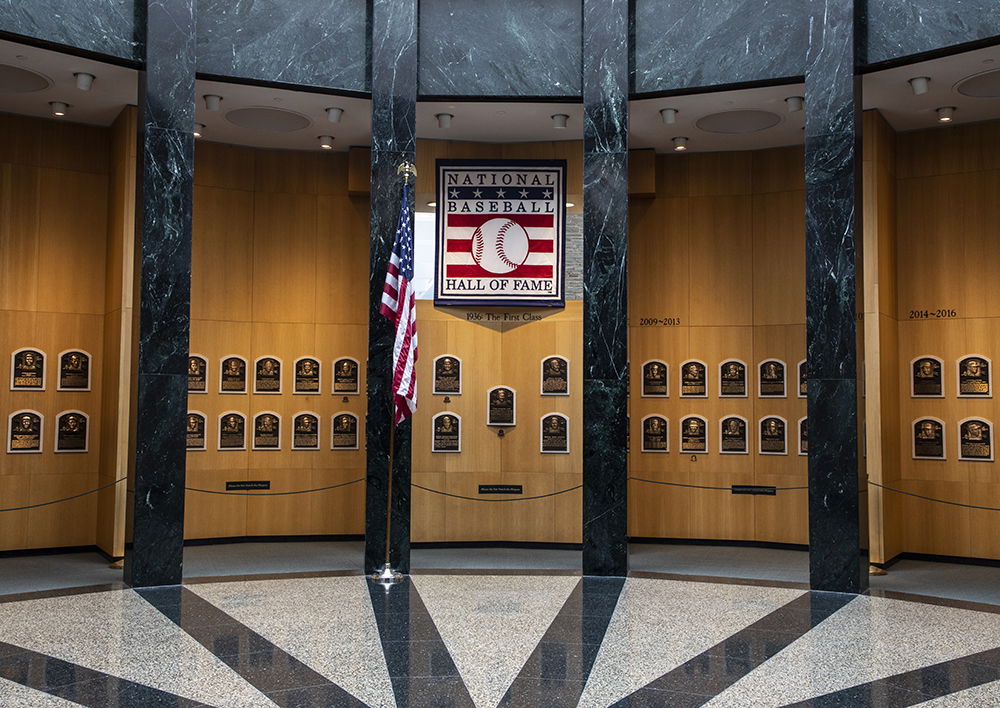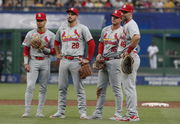

The hallowed halls of Cooperstown are under scrutiny, and not for the usual debates over batting averages or stolen bases. MLB legend Larry Bowa, a World Series champion and five-time All-Star, has ignited a firestorm by claiming that analytics, the darling of modern baseball, are warping the very criteria for enshrinement in the Baseball Hall of Fame.
Watch What’s Trending Now!
“I sometimes don’t know the parameters of how you get in the Hall of Fame,” Bowa lamented in a recent interview, his voice laced with a mix of bewilderment and frustration. “Supposedly back when we played, if you were one of the elite players for 10 years…you had a shot, but now it’s…there’s a lot of analytics involved, there’s a lot of uh, launch angle involved, exit velocity involved.”
Bowa’s words echo a growing sentiment among baseball purists who yearn for a time when grit, instinct, and the intangibles of the game held as much weight as WAR (Wins Above Replacement) and xwOBA (expected Weighted On-Base Average). He pointedly questioned, “There’s a lot of guys that probably should be in that that aren’t in.”
ADVERTISEMENT
Here is a list of players who are eligible for Hall of Fame voting in 2025 🗳️
Who's getting in? pic.twitter.com/iiYuT9cl3g
— FOX Sports: MLB (@MLBONFOX) January 24, 2024
While acknowledging the potential value of some analytics, Bowa cautioned against their overuse, particularly with young players. “To throw that all at them as soon as they sign a contract,” he warned, “sometimes I think that’s overload.” He envisions a scenario where young talent is stifled by an avalanche of data before they have a chance to develop their natural abilities.
This concern over the overemphasis on analytics in player development aligns with a disturbing trend in the sport—a rash of arm injuries among pitchers. Hall-of-Famers like John Smoltz and Greg Maddux, along with former pitching coach Leo Mazzone, blame this epidemic on the obsession with velocity (“velo”) and spin rate, metrics that are often prioritized in analytics-driven training programs.
ADVERTISEMENT
Numbers don’t tell the whole Hall of Fame story, Bowa insists
Bowa’s critique of Cooperstown’s increasing reliance on analytics finds further support in the words of former MLB star Mo Vaughn, who believes that while analytics have their place, they should not be the “end-all, be-all” for evaluating a player’s career.
ADVERTISEMENT
There are pros and cons to sabermetrics but the worst offense of the analytics revolution from an entertainment perspective was the diminished use of base-stealing. https://t.co/V43TX1khnE
— The Case For: A Baseball Hall of Fame Podcast (@TheCaseFor) February 22, 2024
The escalating focus on numbers and data, as Bowa suggests, is not only influencing Hall of Fame decisions but also contributing to a distorted view of what makes a player great. The emphasis on quantifiable metrics like WAR and exit velocity risks overshadowing the intangible qualities that define baseball legends—leadership, clutch performance, and the ability to inspire teammates.
As Bowa aptly puts it, some analytics “just clogs your mind up.” This sentiment resonates with fans who worry that the beauty and artistry of baseball are being sacrificed at the altar of sabermetrics. Many fear that Cooperstown, once a shrine to the game’s greatest heroes, is becoming a repository for statistical anomalies.
ADVERTISEMENT
Larry Bowa’s call for a more balanced approach to evaluating players, one that considers both statistics and the intangibles, is a timely reminder that America’s favorite pastime is more than just a numbers game. It’s a sport with a rich history, a passionate fan base, and a unique ability to captivate and inspire.
Top Stories
Toronto Loyalist Raises Alarm as Shocking Bo Bichette Update Puts Blue Jays’ 2026 Dreams on the Brink

Red Sox’s Alex Bregman Fallout Becomes Evident as Two MLB Rivals Ignite Fierce Bidding War, per Report

$275M Cardinals Star’s MLB Future All but Sealed as U.S. Sportscaster Asks $2.75B Team to Make Bold Move

Mets Become Leading Contender For 30YO Ex-Phillies Star after David Stearns’ Mega Offseason Misses, Per Insider

Kyle Tucker Throws Blue Jays Into Chaos as Ross Atkins Forced Into Harsh Job Cuts

The debate over analytics and the Hall of Fame is far from over, but Bowa’s outspoken critique serves as a rallying cry for those who believe that the essence of baseball cannot be captured by numbers alone.
ADVERTISEMENT
ADVERTISEMENT
ADVERTISEMENT

